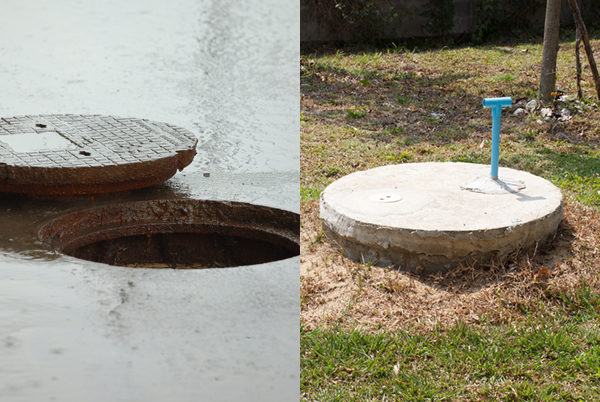Septic vs Sewer System

In the civilized world, every building has some kind of sewer system to deal with wastewater from toilets, sinks, showers, washing machines, and other appliances. Cities usually handle this for residents, with a large-scale sewage system, but it’s expensive to run the lines from house to house, especially in rural areas. The further out you go, the more likely it will be that the home or business you purchase will have an on-site waste treatment facility, aka a septic system. Both work in a very similar way, but if you have a septic system, you’re responsible for the upkeep and maintenance.
How Septic and City Sewer Systems are the Same
Treatment in both types of systems starts out the same. Pipes carry everything that goes down a drain out to a sewage tank. In the sewage tank, the wastewater divides into three layers; scum, effluent, and sludge. The scum is made up of buoyant things, like oil, grease, and toilet paper, so it floats to the top. The sludge is made of heavier things, like waste and detergent. The fluid that’s suspended in the middle is effluent. The effluent is mostly clear of solids, but it’s still full of bacteria. In either type of setup, the effluent goes on to another area for further processing. The remaining scum and sludge are disposed of.
How Septic and City Sewer Systems are Different
With many city treatment facilities, the effluent is simply given a chemical treatment to kill off any remaining bacteria and it’s then discharged. In others, the effluent goes into an aeration tank, where the bacteria removes any remaining organic material from it, and then into a settling tank, which allows most of the remaining particles to settle before the water is drained out. There are also more sophisticated urban systems that have a third level of purification on top of all this, which includes the removal of nitrogen and phosphorus from the water, as well as additional chemical treatments to kill off bacteria.
Septic systems don’t do any of this. Instead, when effluent leaves the tank, it goes into some kind of absorption area, in which the water is released into the soil. Top layers of soil naturally have bacteria that treat the water as it enters, so as long as the system disperses it evenly and slowly, this method is safe. Although some may use a simple pit for this process, and others will use a graywater recycling system, most have a leach field. This is a series of underground perforated pipes, that slowly release the effluent.
Switching to a City Sewer System? Let Septic Tank Pros Augusta GA Help!
At Septic Tank Pros Augusta GA, our skilled partner technicians handle everything related to septic systems, from installation, to repairs, and regular maintenance, too. If your area is switching to the city’s waste treatment facility, we can make sure everything is hooked up properly and that your old equipment is disposed of in a legal and safe manner. For more information about the services we offer or to schedule an appointment, call (706) 204-1717 today.
